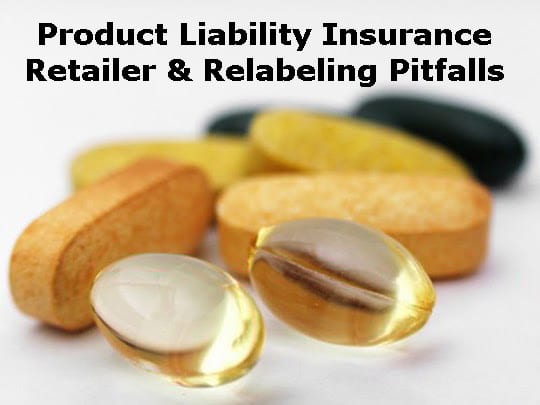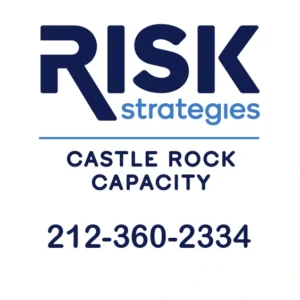Product Liability Insurance – Retailer and Relabeling Pitfalls
 We live in a litigious society; The U.S. legal system encourages lawsuits by allowing plaintiffs to file lawsuits, both legitimate and frivolous, inexpensively.
We live in a litigious society; The U.S. legal system encourages lawsuits by allowing plaintiffs to file lawsuits, both legitimate and frivolous, inexpensively.
Product Liability Insurance – Retailer and Relabeling Pitfalls – It is merely a matter of finding an attorney to take their case, and in the United States, there is no shortage of attorneys. It is estimated that over 40 million lawsuits are filed every year in the United States, and in 2018, the total number of registered lawyers easily exceeds one million. Two thousand eighteen data from the American Bar Association on the general population of lawyers indicate a total of 1,338,678 licensed, active attorneys in the United States, so it isn’t challenging to find one1.
 To make matters worse, personal injury attorneys are willing to take cases on a contingency basis, so a would-be plaintiff doesn’t have to shell out a single dime. When a lawyer takes a case on a contingency basis, it means they are willing to not charge a plaintiff any upfront attorney’s fee unless and until there is a recovery on their behalf. The arrangement, however, will usually require you to pay litigation costs (filing fees, deposition costs, etc.) even should there be no recovery…
To make matters worse, personal injury attorneys are willing to take cases on a contingency basis, so a would-be plaintiff doesn’t have to shell out a single dime. When a lawyer takes a case on a contingency basis, it means they are willing to not charge a plaintiff any upfront attorney’s fee unless and until there is a recovery on their behalf. The arrangement, however, will usually require you to pay litigation costs (filing fees, deposition costs, etc.) even should there be no recovery…
For an attorney to file a lawsuit, it is as easy as filling in the blanks on an already created boilerplate form, print it, submit the suit with the courts for a small fee, and then have a process server serve the defendant the lawsuit. A successful case, even frivolous provides an opportunity to make several thousand, tens of thousands, or even millions, without going to court. The U.S. Department of Justice, Bureau of Justice Statistics says that only 4% of personal injury cases go to trial and that Product liability cases had a median payout of $748,000, this figure doesn’t include including defense costs.2 If you include defense costs in that sum, claims can easily get as high as 1,000,000 dollars. Even worse, there is NO repercussion for filing a frivolous lawsuit, further making lawsuits more attractive.
Quote: “When there are too many policemen, there can be no liberty; when there are too many soldiers, there can be no peace; where there are too many lawyers, there can be no justice.” ~ Lin Yu-Tan Chinese Writer and Inventor
So What is Product liability? Product liability is a liability that is assumed by a seller of a product along the supply chain of that product. This includes the manufacturer down to the retailer. Under the doctrine of strict tort liability, any seller of a product in the United States (not just the manufacturer) is liable for losses, injury, or damage caused by a defective product.
Product Liability Insurance – Retailer & Relabeling Pitfalls – There are basically three types of product liability claims.
Strict liability
a defendant is liable if a product Is defective, regardless of their intent. It doesn’t make a difference or matter if they intended to make a great product, and they took extra care in making sure that the product was safe. The bottom line, if the product is defective and that product causes harm, that defendant will be liable.
Negligence
Is the failure to exercise the care that a reasonably prudent person would exercise in like circumstances.
Breach of the Warranty of Fitness
when a buyer relies on the seller to sell them a specific product that serves a particular purpose or need. 3
Three types of defects that create liability
Design defects
These defects could range from design flaws to defective materials put into the product or once the product is finished, it just it could just be that it doesn’t work properly.
Manufacturing defects
These defects occur during the production or construction of the product. An example would be the equipment used to manufacture the product was damaging the parts. At the same time, they were being installed, or the material used to assemble the product was damaged and not correctly assembling the product.
Defects in Marketing
These defects could stem from improper instructions in how to use the product, or, the incorrect instructions on how to assemble the product if the consumer is expected to assemble the product or the company fails to notify the consumer of some of the inherent risks associated with the use of the product.
So why would the retailer of a product be responsible for a product they didn’t manufacture, and why is it so important they have insurance? “Even though the retail store where you bought the injury-causing product may not have manufactured it, the retailer may still be liable for selling you a defective product. Keep in mind that it is not a question of choosing one defendant over another (regardless of the protests of the retail store where you bought the defective product) — any party involved in the chain of distribution should be named as a defendant in your lawsuit”. 4
What is interesting to know is that there is no federally, standardized product liability law. Each state has its own set of laws when it comes to product liability, which further complicates things for sellers and manufacturers of products. For instance, in 47 states, the plaintiff bears the burden of proof to prove a product is improperly designed. However, In the remaining three states, California, Alaska & Hawaii, the burden of proof lies with the defendant to prove the product is not defective.
This lack of consistency has led to the U.S. Department of Commerce, putting into print The Model Uniform Products Liability Act or MUPLA. The MUPLA has tried to create some uniform processes for product liability claims.
When a third party seller’s operation is physically located outside the U.S., a plaintiff may be unable to sue that party. Although foreign companies selling products in the U.S. are accountable and subject to U.S. Law, tracking them down in their country of origin could be extremely problematic. What is a plaintiff to do? If they do find the manufacturer, they could take up the lawsuit in the country of origin or …………….. they can start looking for the next available defendant in the supply chain, and that is most likely the distributor and the retailer.
Many states have deemed retailers, wholesalers, distributors can be held liable, not because they are merely selling a third party product, but because they were proxies for manufacturers that do not have a physical location in the USA. These out of country manufacturers are therefore judgment-proof or unavailable. Take the recent case where Amazon.com was sued due to a defective product it sold on behalf of a third-party seller.
Amazon maintains and contends that it is a software company for the products it “advertises” and sells on Amazon.com, and therefore it is protected under the Communication Decency Act or CDA. The CDA was set up to insulate a “publisher or speaker” of third-party content. In the suit, State Farm Fire and Casualty Co. V. Amazon.com, Inc. (July 23, 2019, Peterson, J.) State Farm successfully argued that it was not seeking to treat Amazon.com as a publisher of the product description, nor hold Amazon.com liable for product description, State Farm was seeking to hold Amazon.com liable for putting a known defective product into the hands of the consumer. The courts agreed with State Farm.
We also see this a lot of instances where sellers of products put their label on the product, i.e., “private labeling,” and they contend that because someone else manufactured their product, i.e., contract manufacturer, and it is not a product that they physically manufactured, they are not responsible. This is simply untrue. Private labeling is lucrative, attractive, and could be a very profitable business; however, it is not without risk. Private labeling is where a seller of a product outsources the manufacturing to a facility that can do it at a cost much less than a seller, due to economies of scale. These types of manufacturers are referred to as contract manufacturers. In many cases, a contract manufacturer may be located outside the U.S. and are legally untouchable, especially if they have not agreed in writing to be subject to the jurisdiction of U.S. Courts. Many times contract manufacturers may have insurance, except their insurance does not contemplate that someone else is relabeling their product.
In many cases, a contract manufacturer’s insurance may be void if an unrelated entity has relabeled or repurposed the product of the contract manufacturer. Take the case of Target Corporation v. Golden State Ins. Co. Limited (No. B279995, filed 10/10/19). In this case, Target received a drug in bulk and repackaged it in pill bottles for resale. Unfortunately, the relabeled product was improperly labeled, and as a result, someone was severely injured. Target also had a contract in place and was named as an additional insured on the manufacturer’s insurance policy. At a closer look, the additional insured verbiage read………… additional insured coverage did not apply to “[r]epackaging” of products or “[p]roducts which, after distribution or sale by you [supplier] have been labeled or relabeled.” The manufacturer and manufacturers insurer denied covered as a result, and Target was left defending and paying a significant amount of money.
So What are the possible legal defenses when a product is defective? Here are some of your options:
Risk Utility test
if a defendant can provide that the products use or utility outweighs the real risk of harm.
Consumer Expectation Test
if a reasonable consumer was using a product thought to be defective impartially and fairly, then the defendant could not be found liable, even if the product design defect resulted in injury to the plaintiff.
Product Liability Insurance – Retailer and Relabeling Pitfalls – So how does the retailer, distributor, wholesaler & manufacturer protect themselves against lawsuits……….enter product liability insurance.
What is product liability insurance? Product Liability Insurance is security against financial loss arising out of the contractual liability incurred by an insured because of damage or injury emanating from the use of an insured product. There are other product liability coverages whose application may apply in construction, i.e., completed operation otherwise known as construction defect, but we will address this topic in a separate article.
An adequately put together product liability policy will provide legal defense, and in the event of a judgment against the insured, the insurance carrier will pay indemnity. What is an Indemnity Payment? An indemnity payment is defined as losses paid or expected to be paid on behalf of an insured to a third-party. I say correctly put together product liability policy because there are some property and casualty brokers out there that think its “cute” to insure manufacturers and classify them as retailers or distributors. The rate for a retailer and distributor is argumentatively lower than a manufacturing class, as the product liability exposure is not contemplated under the retailer and distributor class code. This is how some brokers like to sell policies, by making the coverage as cheap as possible to entice a would-be buyer to purchase a policy, unfortunately, to the detriment of the seller. Retailers and distributors do not manufacture products, and the products they sell are usually bought from manufacturers. When those manufacturers are located in the United States, those manufacturers would be responsible for the products they manufacture, either through insurance or other means. The problem arises when retailers and distributors are selling products they obtain directly from overseas, or assuming that manufacturers have the proper insurance or any insurance at all. Take the suit above about Amazon facilitating the products of a third party. In this instance, the manufacturer’s operations were not located in the United States, and people were injured, property was damaged, and as a result, the buyer had no recourse against out of country manufacturers, so plaintiff’s filed a successful suit against Amazon.
What could happen in the event of a claim if a business was classified as a retailer, wholesaler, or distributor instead of a manufacturer? A lot! First off, the insurance carrier can issue a “reservation of rights.” a Reservation of Rights — A notification to an insured from an insurance company that lets the insured know that they will be investigating (possibly defend) a claim to find out if coverage may apply in whole or part or may not apply at all (denial) without waiving its right to later deny coverage based on information revealed by the investigation.
What happens under a reservation of rights letter? The insurance carrier can review the application that was submitted to the broker and the insurance carrier. Many insurance carriers use a universal insurance application, and these applications were created by a nonprofit company called ACORD. No ACORD is not an insurance company, which some people think because they see the application or a certificate of insurance with the words ACORD on the top left and automatically assume ACORD is the insurance company. Even if certain carriers do not use ACORD applications, they utilize applications that are very similar to ACORD. The question that many carriers on a product liability application are there foreign products sold or distributed in the USA? Are Foreign parts used as components? Are products of others sold or repackaged under the applicant’s label? If you answer no to any of these questions and there is a claim involving a foreign part or product, you could end up with a denial of coverage for material misrepresentation. You ask how? Well, if that carrier knew that you were importing that product or components, they would never have accepted the risk.
If you are repacking products under your label, you are also considered a manufacturer. The response I get to that comment is, isn’t the manufacturer responsible? Doesn’t the manufacturer have insurance? The answer is always cut and dry; the manufacturer is liable if the plaintiff can get to them, i.e., they are located in the U.S. In the meantime, you as the seller would be the one sued because your name is on the label.
Guess what? If it is a serious enough claim, it has been the case that an insurance carrier will cancel a policy, refund your money, and you are left with an uncovered claim. I stated it above and I will leave you with an important statistic, when it comes to product liability claims ……………the median product liability payout is approximately $748,000, AND this figure doesn’t include defense costs. Defense costs alone can tally up to 1,000,000 per case, not an easy amount to cough up if you do not have insurance.
You get what you pay for, and if they’re a big difference in prices from one broker to the next, ask yourself why.
Click Here for a Product Liability Insurance Quote or Call one of our qualified and experienced insurance brokers today to help you review your current coverage and help you properly insure your products.
Footnotes
1. https://www.americanbar.org/news/abanews/aba-news-archives/2018/05/new_aba_data_reveals/
2. https://www.bjs.gov/index.cfm?ty=tp&tid=45
3. https://www.merriam-webster.com/dictionary/negligence
4. https://www.nolo.com/legal-encyclopedia/defective-product-liability-claims-who-29606.html
Product Liability Insurance – Retailer and Relabeling Pitfalls
By: Jon Lipton
Published: May 11, 2020 at 08:10


